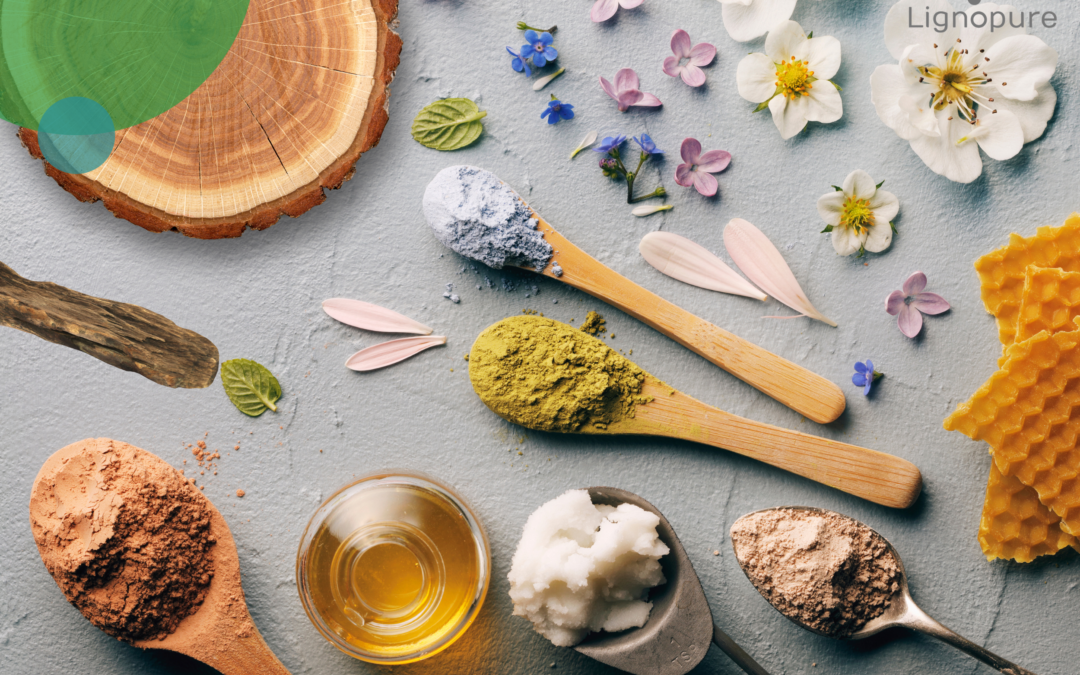
Written by: Gabriela Meza Armenta – Marketing and Business Development Manager at Lignopure
The market for natural cosmetic products with sustainability aspects has increased, and with this, the demand for plant-based ingredients, which traditionally contribute to the naturality and sustainability of a personal care product. For this reason, and to increase even more the naturality and sustainability of different formulations many cosmetic companies have started to look for upcycled ingredients from plant sources that help them to reduce their environmental impact and support the new circular beauty movement.
What is upcycling?
Upcycling is the process of transforming by-products or waste materials into new materials or products. Unlike recycling, which typically involves breaking down materials to create new products, upcycling focuses on creatively repurposing or upgrading existing materials to give them a new life and purpose. Upcycling then aims to reduce waste, conserve resources, and minimize the environmental impact of consumerism by finding innovative ways to transform our fully utilize multiple resources.
Upcycled ingredients in the cosmetic industry
Upcycling can take various forms and be applied to different materials but in the cosmetic industry, the main source of raw materials for upcycled ingredients has been until now food sources, but as the demand for these ingredients keeps growing, technical innovations are surging facilitating the development of upcycled cosmetic ingredients from non-food sources. This is the case of our LignoBase upcycled ingredient line, which comes from upcycling a by-product called lignin, which is a multifunctional natural polymer with protective properties found in non-edible parts of plants.
Some examples of upcycled cosmetic ingredients are:
- Upcycled oils: Oils obtained from food waste or parts of the fruit or plant of origin not used in food industry.
- Upcycled scrubs: Ground nutshells, coffee grounds among others can be upcycled to be used as mechanical scrubs.
- Upcycled floral waters: Also known as hydrosols, are a by-product of the distillation of essential oils and thanks to their subtle fragrance, they can be used in multiple cosmetic products.
- Upcycled extracts: These can come from edible and non-edible plant sources and can be repurposed in cosmetic products for their natural functional properties.
Advantages of upcycled cosmetic ingredients
The beauty and personal care industry is a sector with a vast number of consumers and therefore a big responsibility to help the conservation and good utilization of natural resources as part of a worldwide sustainability pact. This is where upcycled ingredients come into play, by helping manufacturers achieve their circular goals by using by-products to therefore reduce the demand for new harvesting processes, decrease the possible implementation of mono-crops and lower the CO2 emission rate of the products where they are used.
At the same time, the use of these innovative ingredients to create sustainable and eco-friendly final products promotes the full valorization of our natural resources and in the case of ingredients from non-food sources, like Lignopure’s LignoBase line, their use helps to support The United Nations SDG #2, which explains and indicates that by 2050 9.3 billion people will be in nutritional need and therefore we have to prioritize the use of food sources for this essential purpose.
Overall, utilizing upcycled cosmetic ingredients is a way for the beauty industry to embrace sustainability, reduce waste, and make a positive impact on the environment. It aligns with the principles of the circular economy and promotes a more sustainable and responsible approach to production and consumption.

